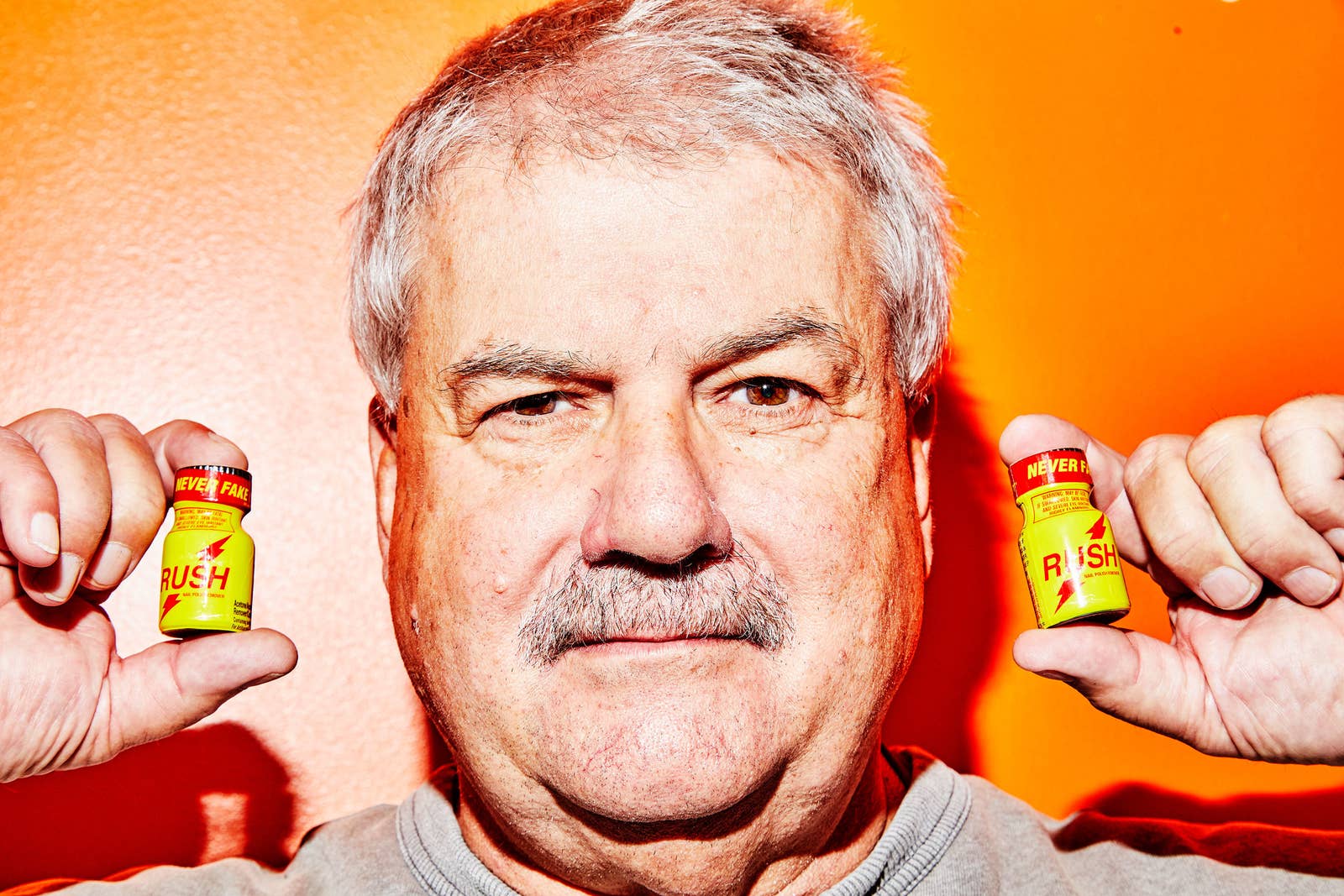
What if I told you that right now you could walk into any one of thousands of stores across the US and buy a drug that’s been banned by the government?
That the feds know about this hush-hush trade but mostly look the other way?
That while almost every gay man could name the drug, very few could tell you exactly what is in it or where it comes from?
And that this drug — poppers — will probably give you some of the most intense, room-spinning, holy-shit-I’m-going-to-come sex you could possibly imagine?
It’s been roughly 50 years since poppers emerged as a recreational drug in the gay community. In that time, they have become an almost defining product. Their sharp chemical scent evokes both sex and dancing — two activities that can be communal experiences for gay men. “I think there’s a sense of ownership, that this is ours,” said Adam Zmith, a British writer set to release a book this year about poppers and the gay community, Deep Sniff. When I asked Zmith if there was an equivalent product in straight culture, he quipped, “Mortgages? Children?”
Today, the small brown bottles feel somehow both ubiquitous yet scandalous. They are, first and foremost, a sex drug. When their vapor is inhaled, poppers create a sudden, brief rush of passion that can — crucially, for many gay men — help to loosen the anal muscles. But it’s also not uncommon for groups of men (and sometimes their straight friends) on a dance floor to pass them around semi-discreetly, enjoying the giddy, two-minute high together, one nostril at a time.
Poppers have also become more culturally prominent. Lena Dunham has done them. Sam Smith said they did them with the lead singer of the Pussycat Dolls (producing the truly incredible headline: “Nicole Scherzinger Loosened Up Her Buttons With Poppers at a Gay Bar”). There was a joke about Liberace doing poppers in the first episode of HBO’s Hacks. Charli XCX autographed a bottle for a fan, held it up to the camera, and yelled, “Gay rights!”
But poppers aren’t exactly a household name, at least when compared to other recreational or sex drugs like molly or Viagra, especially among straight people, even if more of them are using poppers. “Consider poppers the homosexual peyote,” the LGBTQ magazine the Advocate declared in 2013, writing that they have an “open secret status” and that few outsiders “know the first thing about them.”
As it turns out, not many insiders know much about them, either. Where did they come from? Who made them? How did they find their way onto the shelves of sex shops and corner stores? And who was profiting? I decided to find out.
I started with the web address listed on a bottle of Rush; with its red-and-yellow lightning bolt packaging, it’s by far the most recognizable brand. The bare-bones website, belonging to a company called Pac-West Distributing, complained of fake and dangerous imports from China masquerading as the real thing, but listed just one email address for customers to report imitators. “NO OTHER INQUIRES WILL BE ANSWERED, SORRY!” the site warned. All my emails went ignored.
Next, I searched the US Patent and Trademark Office database, figuring any company angry about knockoffs probably has a registered trademark. Sure enough, there was the Rush lightning bolt, registered to Pac-West Distributing. Its date of first use traced all the way back to Dec. 15, 1976. The address listed was a PO Box in a strip mall in Las Vegas. The trademark attorney who filed the application promised to pass on my request to Pac-West’s owners, but I heard nothing.
When I looked into Pac-West, I stumbled on a series of lawsuits and countersuits between the company and a business in Pennsylvania that had been filed in federal court in 2019.
The yearslong legal dispute is rather mundane and complex — allegations of trademark infringement, breach of contract, and libel — but as I read through Pac-West’s 2019 legal complaint, I noticed something. There, printed in full color — no doubt for the benefit of a judge who probably did not go to law school for this — were pictures of various brands: Iron Horse, Rush, Gold Rush, and Super Rush. But the filings describe the products only as cleaners, incense, or nail polish removers. In their descriptions, attorneys coyly state that the products “have acquired a strong secondary meaning” and are “among the most recognized in the LGBTQ community.” Even the judge, in an interim order, only referred to them as “cleaning products.”
I spent weeks reaching out to the companies and their attorneys. I dug up home numbers for those named in the litigation. No one wanted to talk. Then I dialed the Pennsylvania business one final time.
When the owner, Everett Farr, heard about my intention to write about his business, he told me he’d thought: “I can either meet this whale head on and he’ll have the complete truth or I’ll be smeared with smithereens. So I said, Fuck it.”
“Nobody knows this industry at all. The misconceptions are astounding,” he told me in our first brief call. “There are probably three or four people in this world that understand everything about it. And I’m one of them. I am the one.”
He sighed deeply, sounding resigned.
“I will teach you everything.”
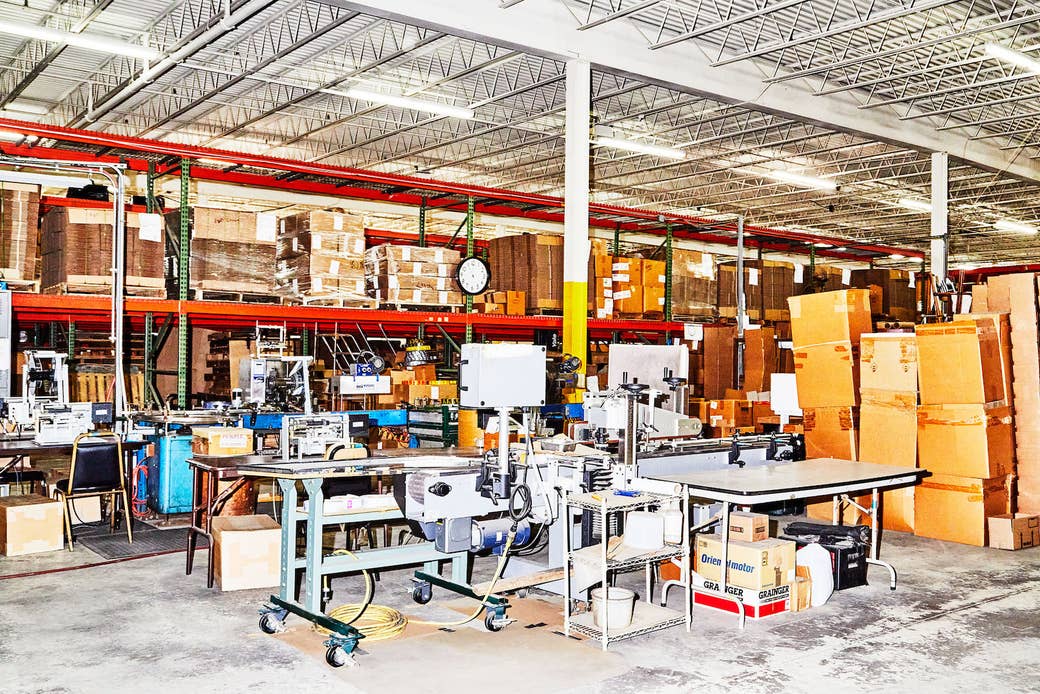
It’s important to understand how poppers work. They contain alkyl nitrites, chemical compounds that consist of nitrogen, oxygen, and alkyls. An alkyl is a carbon molecule with hydrogen molecules attached to it, and the number of carbons is crucial because it will determine the boiling point of the substance, explained Rick Sachleben, a member of the American Chemical Society. Too few carbons and it will evaporate too easily — too many, and the liquid won’t vaporize at all. The ideal number of carbons is four or five, producing butyl and amyl nitrites, respectively.
As the nitrites vaporize and their scent is inhaled, the human body converts the chemicals to nitric oxide, which causes the blood vessels to relax and expand, leading to a drop in blood pressure. (French chemist Antoine-Jérôme Balard first synthesized amyl nitrites in the mid-19th century, and they have been used to treat angina.) “It will cause you to get light-headed,” Sachleben told me. “But they also have psychoactive properties to some extent. That’s what people are using them for recreationally.”
“This is nothing new,” he added. When Sachleben was in college in the 1970s, people were using poppers as party drugs.
For decades, amyl nitrites were originally sold in individual glass ampoules that had to be crushed or popped in order to be inhaled, hence the name. But by the 1960s, nitroglycerin tablets replaced amyl nitrites as the preferred treatment for angina and the medical market all but dried up — until savvy manufacturers realized other customers were already buying the product for a different use.
Sensing a huge commercial opportunity, two entrepreneurial gay men seized their chance. The first was Clifford Hassing, a medical student who trademarked his Locker Room product in 1974 in Los Angeles. But the biggest player arrived two years later, when W. Jay Freezer founded Pacific Western Distributing in San Francisco and began selling Rush, a name he came up with based on the brief dizzying sensation poppers can arouse. Seven years earlier, the FDA had classified amyl nitrite as a prescription drug, but Freezer got around this by tweaking the formula to create an isobutyl nitrite and selling his product as “liquid incense.”
Above all, Freezer was a salesperson. He blanketed the nascent LGBTQ press with advertisements featuring Tom of Finland–esque illustrations of burly, shirtless men pumping gas in suggestive ways. Within a year, he was bombastically claiming that he had cornered 60% of the market and that retail sales exceeded $20 million (Hassing refuted this at the time). “If Safeway supermarket customers want the product,” Freezer confidently told the Wall Street Journal in 1977, “I don’t see why it couldn’t eventually be sold there.”
Rush soon emerged as one of most recognizable products in the gay community — Vice would later dub it “the Nike of inhalants.” By 1981, Freezer was proudly proclaiming he made “the third legal hedonistic product in America, along with tobacco and alcohol.”
Barbara Paschal, whose company, Marburg Industries, made Freezer’s packaging machines, said she and her father, who owned Marburg at the time, didn’t initially ask too many questions. “It was just another machine for a customer who had a product,” she recalled to me when we spoke over the phone.
She remembered Freezer flying down in a jet to visit, usually accompanied by a different lover, taking the Marburg team out to dinners and bringing gifts for her young daughter. Freezer was one of the first openly gay men she had ever met. “He was basically very down-to-earth, but eccentric in his own little ways,” she recalled. “He was a man with a lot of money. He was able to do what he wanted. Being gay at the time was kind of an under-the-table, taboo thing.”
Freezer was also one of the first people that Paschal knew who became sick with HIV. In 1985, he died, and by this time, the AIDS crisis was in full swing. Its causes were still a mystery and poppers quickly became a suspect. Some in the gay community feared the drugs were causing this new form of “gay cancer,” perhaps by weakening the immune system or mutating cells through supposed carcinogenic properties.
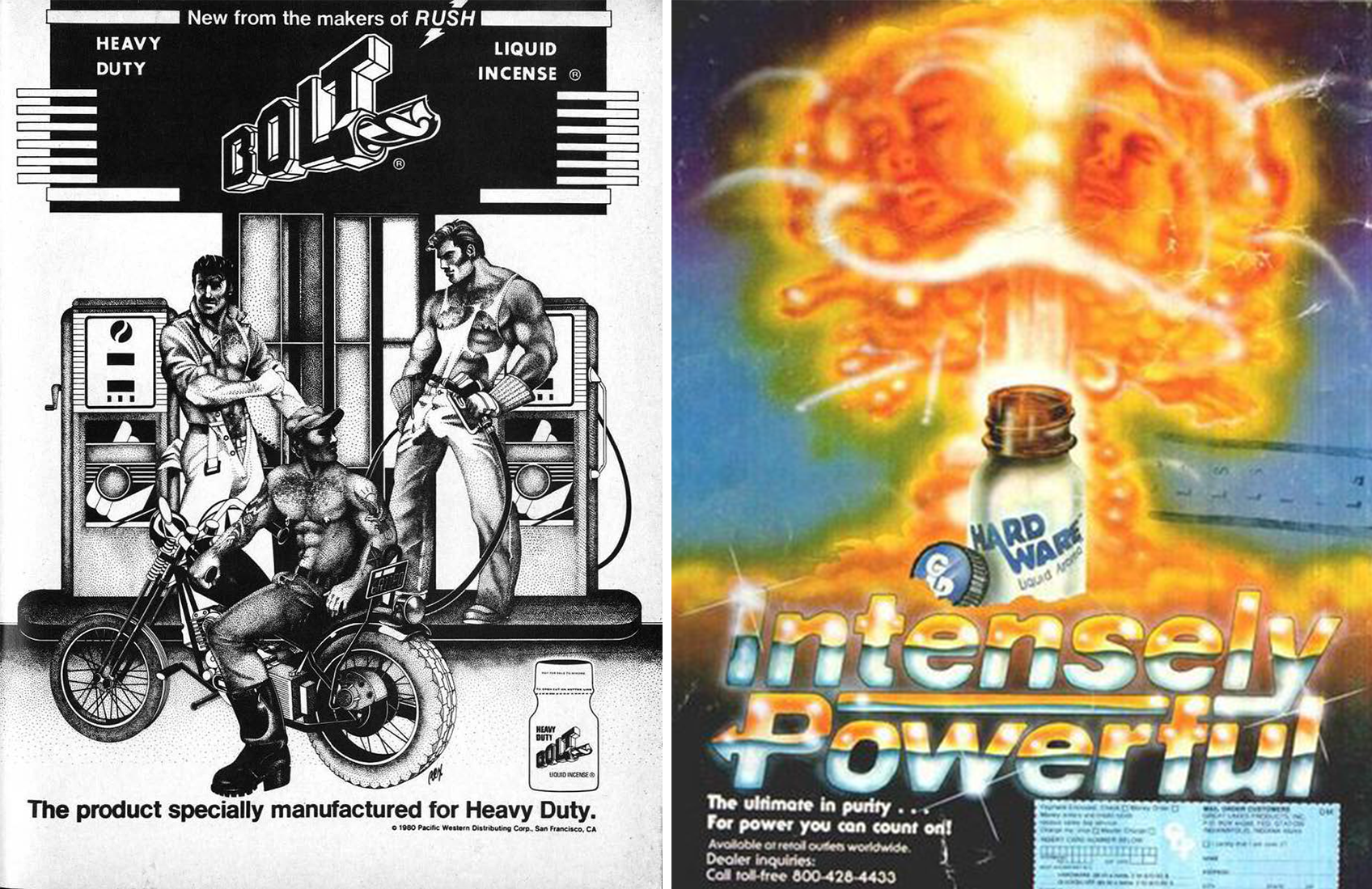
Because of the drug’s ties to sex culture, gay activists John Lauritsen and Hank Wilson suggested that the drug was either a direct cause or at least a cofactor in HIV. In their 1986 booklet, Poppers & AIDS, they complained of the “ubiquitous” odor of poppers in New York City gay bars, where men danced “zombie-like” with the bottles under their noses. “Normally every drug in the US must undergo extensive testing before it can be sold legally. Not poppers,” the pair wrote.
By 1990, the federal government had taken notice of these concerns; a bipartisan group of lawmakers passed a bill adding volatile alkyl nitrites to the list of banned hazardous products under the Consumer Product Safety Act.
Mary Toro, who worked for the US Consumer Product Safety Commission for 30 years before retiring in 2018 as its director of regulatory enforcement, told me poppers manufacturers would try to flout the ban, disappear when regulators took notice, then resurface under different names. Still, some entrepreneurs, like Farr in Pennsylvania, changed their recipes to make cyclohexyl nitrites, a slightly different chemical compound that wasn’t subject to the federal ban, although it wasn’t as powerful or popular as the original formulations.
Toro’s regulators had some limited success. In 1997, officials successfully criminally prosecuted two men who sold alkyl nitrites, but the pair only received sentences of probation. Three years earlier, in 1994, the CPSC accepted a $10,000 civil penalty settlement from Great Lakes Products Inc., which regulators had accused of illegally exporting the drug.
Great Lakes was run by Joe Miller, an Indiana entrepreneur active in that state’s politics, who had absorbed Freezer’s company and its brands after his death and further expanded it. Miller made a small fortune by exporting Rush overseas and through the black market in the US, according to a man who worked with him over two decades but asked to remain anonymous due to the illegal activities. “I think everybody knew but they knew it wasn’t illegal like go-to-jail illegal,” he said. “It was illegal-lite ... slap-on-your-hand illegal.”
With a background in marketing, this man helped with branding and inventing new derivations for Miller: Super Rush, Black Rush, Gold Rush. He estimates he personally made a few million dollars in the process of differentiating the brands. “‘Make it red and shiny, but black is more expensive.’ Those simple marketing tricks you see everyday. ‘Supersize it. Glitz it up and it looks like it’s worth more,’” he said. “Everything in the bottles was exactly the same, but all the prices were different. I’d laugh because I’d see people swearing one was stronger.”
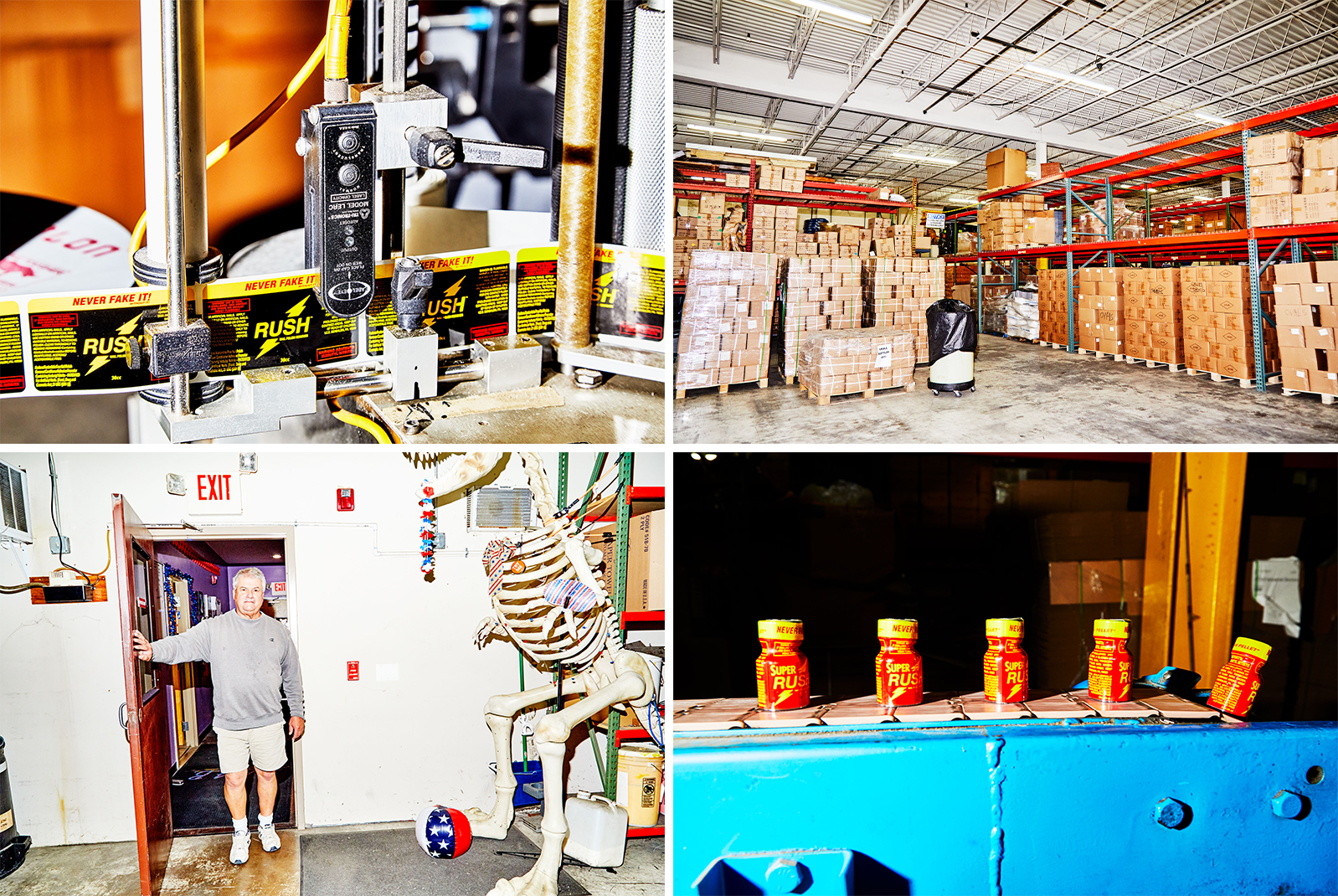
As other countries increased their regulations, it became harder to export poppers overseas. So Miller pivoted, selling the banned alkyl nitrites in the US but under different labels, his business associate said. “He was very careful about who he did business with because he wanted to protect his golden egg,” the man said.
It’s unclear exactly what happened next — both Farr and Miller’s associate suspected the government was closing in on him — but Miller killed himself at home on Aug. 26, 2010. Officials with the Marion County Coroner's Office confirmed to me that Miller died by suicide from “asphyxia due to nitrogen inhalation.”
Poppers do pose some health risks. Drinking the drug rather than inhaling it can cause a sometimes fatal condition where the blood can’t carry enough oxygen. Inhaling the drug can cause dangerous drops in blood pressure and thus strokes or heart attacks for people with circulation or heart issues, or people who take erectile dysfunction medicines. But for most people, the side effects are short term, and one study found that they are not addictive.
Still, a drug is a drug, and officials advise against the use of poppers. During Pride this year, the FDA released one such warning. Jeremy Kahn, an FDA spokesperson, told me the public advice was prompted by an increase in reports last month of hospitalizations and deaths from poppers. Pushed for specifics, he said there had been approximately 20 “serious adverse event reports,” only six of which had occurred in 2020 and 2021. At least two death reports were received in the same period. Some of the cases involved people drinking or ingesting the drug. “Poppers are not safe products for recreational use or sexual enhancement and should never be ingested or inhaled,” Kahn said.
Canada has required prescriptions for alkyl nitrites since 2013, and both the UK and Australia have come close to doing the same in recent years — moves that prompted backlash in those countries’ gay communities. One conservative British MP, Crispin Blunt (uncle to actor Emily Blunt), gave a speech in Westminster “outing” himself as a poppers user and calling a potential ban a “fantastically stupid” idea that would only fuel the black market. In Australia, the LGBTQ media dubbed it “an attack on gay and bisexual men” and a “war on bottoms.”
Zmith, the British writer, doesn’t believe the regulations governing poppers are motivated by anti-gay sentiment, but instead by “the complete madness” with which Western governments approach drugs — tolerating some dangerous substances, such as alcohol and tobacco, but cracking down on others.
As something of a truce, poppers manufacturers and regulators have entered into what Zmith describes as an unspoken deal: zero explicit advertising and a limited market in exchange for regulation and enforcement that is less sharp-toothed than other drugs receive.
“I see this whole thing as an amazing, bizarre queer performance — this strange dance between regulators and people that want to fuck each other in the bum,” Zmith said. “Here’s this thing that everyone knows exists and is in the open and is available, and yet no one talks about it. And no one really wants to know the full details. And it’s like, Hello! Queer history!”
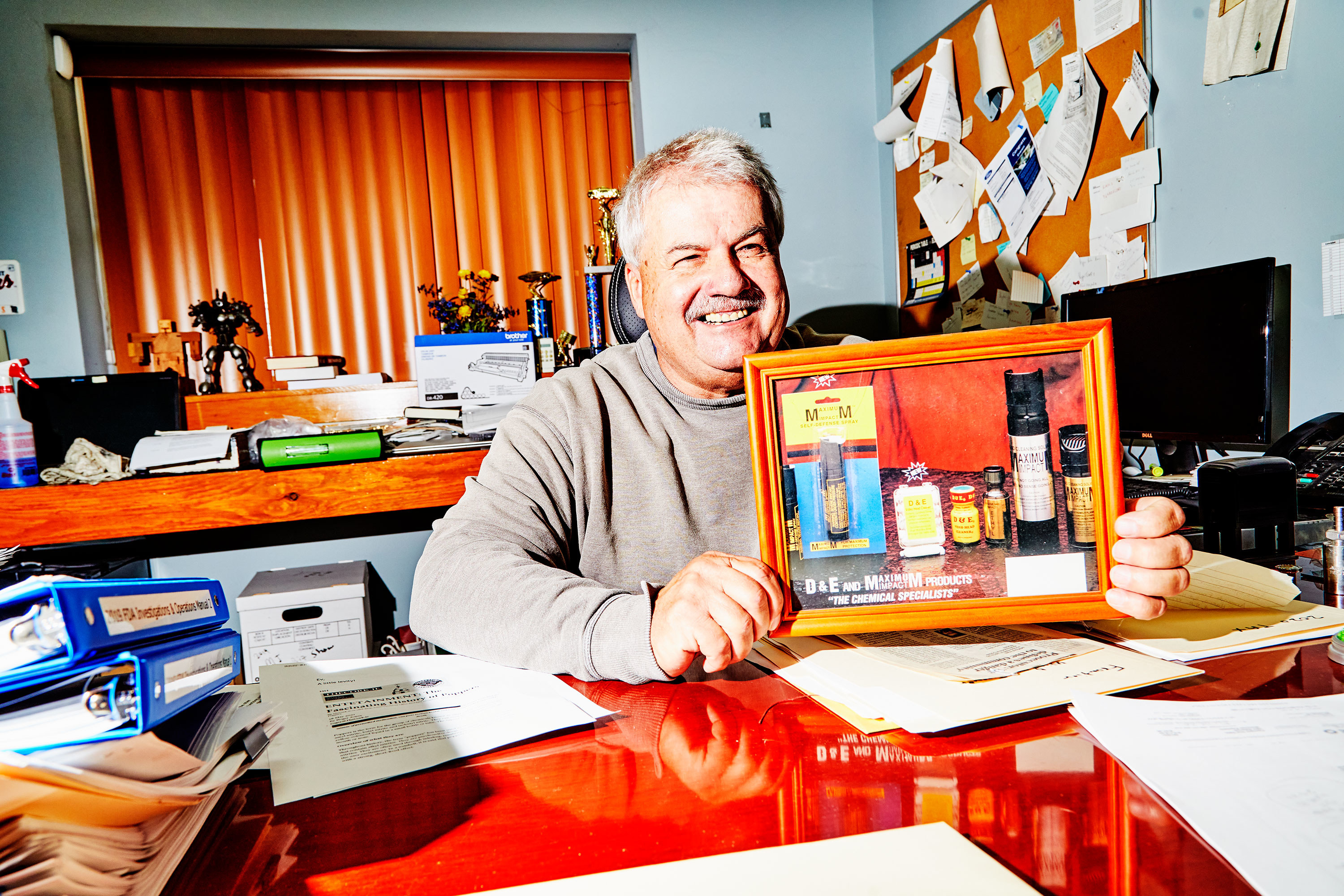
Everett Farr, 65, is not the person you might expect when you think of nitrites and queer history. For one thing, he says he’s never tried poppers. For another, he’s straight, married, and has two adult children. He lives in a big home in a ritzy Pennsylvania county and owns a few cars, including a Corvette the same yellow as a bottle of Rush. But he’s not exactly flashy. When he met me at the train station near Philadelphia to drive me over to his plant in the last week of June, he was wearing shorts and sneakers and driving a modest, cluttered blue passenger van. The Corvette was parked inside the factory, covered in a layer of dust.
Farr requested three things in order for me to visit his factory. First, that I didn’t name or photograph any staff who work for him. Second, that I didn’t name his company, despite it being easily searchable in public records. He said that the story could make things difficult for him with insurers and suppliers (not to mention the feds, who he fears might tie him up in costly investigations, shut his trade down, or even prosecute him), so he asked that I refer to his company by its former name: SVT, which used to stand for Superior Video Technology. And third, that I stress as clearly as I can how he labels and sells his products. “As far as I’m concerned, I sell nail polish remover,” he told me repeatedly. That is indeed what is printed on the bottles — whatever else you might call them is your business.
In 2009, Farr registered an official patent for a nail polish remover composed of an alkyl nitrite solvent. He said he came up with the idea — somewhat ironically described in the patent filing as “less odorous” than typical acetone-based removers — after a woman in his factory complained the liquids were always ruining her fancy nails. Given this categorization, Farr and his lawyers argue his manufacturing of alkyl nitrites falls under a Federal Food, Drug, and Cosmetic Act exception listed in the 1990 ban. “I’ve been taught that I read the law, I interpreted the law, I comply with the law,” he said. “And that’s really it.”
Farr’s company website also makes no mention of poppers. (He decries other vendors who sell them online under that term as flouting the law and drawing undue attention.) The webpage notes only that the company is a manufacturing and engineering business that specializes in “diverse” fields, from dietary supplements to chain-link fences. “My website tells the truth,” Farr told me. “You just have to know what to read between the lines.”
Such contortions are common for any manufacturer that doesn’t want federal regulators shutting them down. “We sell cleaners, not poppers,” I was told by Brian Bondy, who with his business partner Julian Eterno employs three staff in Austin, Texas, to make a boutique product, Double Scorpio. (These cleaners can sometimes be purchased from fridges in gay bars.)
Farr first began making nitrites in 1991 when he was approached by someone in the adult industry about the possibility of bottling the products in the back of the autobody shop he ran. He then began working on other adult products as he met more people in the industry; one of his inventions allowed men to make molds of their own penises that could be used as dildos.
He never expected to be bottling “liquids,” as he sometimes calls them, for three decades. But he can’t seem to quit. The money is good and reliable, and his 29-year-old son will require a full-time carer for the rest of his life. “I decided if I’m going to sell my soul to the devil, I might as well make money doing it,” said Farr.
Very few people outside his immediate circle know about this part of what he does. “My daughter didn’t know when she was in high school, but when she started researching on the internet, she figured it out,” Farr said. “And I’m like, ‘Well, honey, it put you through college!’” With a proud smile, Farr said she now delights in visiting gay friends’ apartments and pointing out the products her dad has made.
Inside the nitrites factory, a one-story warehouse about half the size of a football field in a nondescript industrial area, were rows and rows of industrial shelving, each overflowing with boxes of small bottles. Farr estimated that he gets new container shipments of the empty bottles from China two to three times a year.
A dozen or so workers were on the clock. At one noisy machine, a man placed bottles on a rotating silver tray that funneled them toward metal straws pumping alkyl nitrites from a large plastic drum. Then, the bottles continued to a separate part of the machine that affixes a lid. The factory’s daily output is roughly 23,000 bottles, which are filled with formula made during that same shift.

Between supplies, labor, and insurance, Farr said it costs about $1 to make each 1-ounce bottle. He sells them to distributors for $4.50 each; the distributors then sell them to sex stores and bodegas for about $6. Those stores charge customers around $20. Farr estimates it’s a $40 million retail industry, of which he controls 75% of the market, though there are no trade figures to back up these claims — it’s just a feeling he has based on how long he’s been working in the adult industry.
One of the employees told me he first began working for Farr years ago, making dildos. Nearby, Farr’s sister-in-law was sitting at a table next to a radio playing classic rock as she popped silica balls into empty bottles. This helps ensure no water will spoil the product. “This is what I do,” she explained matter-of-factly. “If I’m not interrupted, I could do 18 to 21 cases a day. I was lucky if I got through seven when I first started.” At another station nearby, two men packed boxes of sex toy cleaner.
Over by the labeling area, rolls of brightly colored stickers sat on the shelves. In the 1990s, Farr licensed the Rush brands from Miller’s Great Lakes. He still makes those products, along with several other brands. Pac-West Distributing also makes Rush products, and it takes a careful eye to distinguish the two versions. (Trent Taylor, who now owns Pac-West and is suing Farr’s business, did not respond to multiple requests for comment. His attorneys finally told me in an email that it was not appropriate for any of the parties to comment on the pending litigation.)
Despite the different branding, Farr said the recipes are essentially the same across every bottle — even those made by his competitors. “The one thing that everybody has to realize in the end, and I hate to break the news to them,” said Farr, “but every single bottle is exactly the same thing. And it’s been that way since time and eternity.”
A roll of Super Rush packaging was loaded into a Marburg machine — Farr still uses the same type that Freezer did in the ’70s. A parade of bottles entered on a conveyor belt and emerged on the other side covered with lightning bolt labels, then slid off and landed in a box. Farr said the sound of each one clinking into the pile makes him think of another dollar earned.
Nearby sat a middle-aged white man with a long beard. He said he began working for Farr almost 27 years ago after getting laid off from a job driving a tractor trailer. Does he know what he’s been bottling all this time? “I’m going to plead the fifth on that one. That’s what I’m going to do,” he replied.
“This has been out there since I was in school,” he said after some prodding. “I don’t tell people what I do. I just say it’s a cleaning product. I don’t get into it with people. Once I tell people it’s an industrial cleaning product, it stops right there. I don’t tell nobody nothing.”
Farr mentioned another employee who he says got out of rehab years ago and struggled to find a job until his dad called up and asked if his son could work for Farr. He’s now the main sales rep for Farr’s dildo company. “His father told me five years later I made a man out of him. I put him through Everett bootcamp,” Farr said. “I know it sounds corny. I get a lot of satisfaction out of that. Every one of these people have a nice house, they drive a nice car.”
Over the years, Farr has sought reassurance from others, including his lawyers and his doctor, to try to justify what he’s doing for a living. “Without this product, a multitude of gay men cannot have gay sex. Bottom line,” he said earnestly. “I’m telling you from the bottom of my heart. If it was hurting people, I wouldn’t be in it.”
He worries about the ramifications of this story, as well as what the FDA’s recent public statements about poppers might mean for his business. (The FDA warning also spooked Miller’s old associate, who said he couldn’t imagine a worse time for this article to be published and that Farr was “insane” for speaking with me. “In this business, the whole modus operandi is don’t draw attention to yourself, don’t do BuzzFeed, don’t advertise, don’t do social media,” Miller’s associate said. “Why bring attention to yourself?”)
But it’s clear Farr enjoyed being able to speak candidly to a reporter about the kingdom he has built. When he flies on airplanes and finds himself chatting with a gay guy sitting next to him, he’ll delight in coyly explaining what he makes and watching the reaction.
“I’m going to go broke,” he told me, “but I will be in the gay hall of fame.” ●
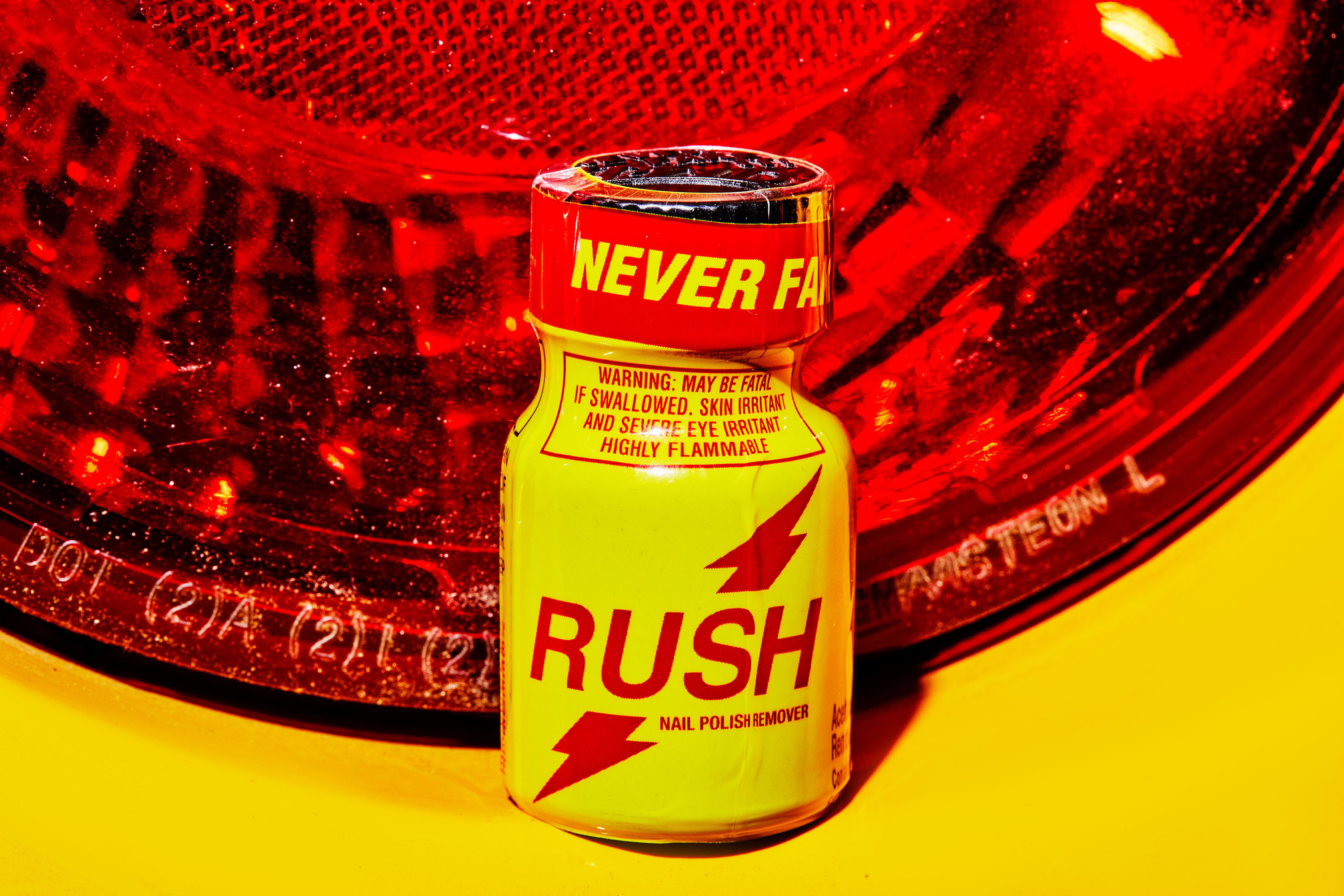
UPDATE
This post has been updated to remove unverified details related to the manner of Joe Miller’s death.
